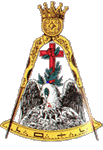

The Officers of the Rose Croix Welcome You to the Valley of Springfield


Springfield Chapter of Rose Croix
17° - 18° - Conferred in a "Chapter of Rose Croix"
Loren C. Heiple ....................................Most Wise Master
Merle T. Fox...........................................Senior Warden
Steven L. Scaife...................................Junior Warden
Dale L. Krouse......................................Orator
Leslie J. Thomas.................................Master of Ceremonies
..................................Captain of the Guard
“It is the hour when the veil of the Temple was rent in twain, when darkness reigned and consternation oppressed all the earth, when the flaming star was eclipsed and the Shadow overcame the Light, when the Columns and Working Tools of the old Masonry were shattered, and when the Cubic Stone sweat water and blood, the instant when the Word was lost.”
THE FEAST OF THE PASCHAL LAMB PROGRAM
In keeping with ancient custom, and in accordance with the Constitutions of the Supreme Council, each Chapter of Rose Croix should observe the Feast of the Paschal Lamb by an appropriate ceremony. Traditionally, this day of obligation is Maundy Thursday.
In deference to the churches which commemorate this Holy Day on the traditional Thursday before Easter, Rose Croix Chapters are permitted to hold the ceremony on another day. For many years our Chapter has observed The Feast of the Paschal Lamb on the preceding Wednesday.
The Feast of the Paschal Lamb is neither the Feast of the Passover nor the institution of the Sacrament of Holy Communion, although it commemorates both Holy Days.
The Jewish Feast of the Passover commemorates the escape of the Hebrews from Egypt, when God, smiting the first born of the Egyptians, passed over the houses of the Israelites. Thus the blood of the Paschal Lamb, which had been used to mark the houses of the Israelites, has symbolized redemption. For observance of this Feast, Jesus gathered his disciples on the night in which he was betrayed. In their midst he instituted the sacrament which Christians revere as The Last Supper.
Chapters of Rose Croix observe this beautiful and symbolic celebration of the Feast of the Paschal Lamb as a memorial service, honoring our Brethren who have passed to their eternal reward during the preceding year. In spirit, we seem to sense their presence at the Mystic Banquet as we seek to strengthen the ties of brotherly love which bind our hearts in holy remembrance.
BACKGROUND
In the fellowship of kindred minds, we meet to express our faith as symbolically we break the bread and drink the wine of fraternal love, becoming aware once more that the only hope of a better world still abides in the simple command of our great Exemplar, “Love one another.”
The ordinance establishing the Feast of the Paschal Lamb dates back to the Old Testament narrative ~ “And this day shall be unto you a memorial: and ye shall keep it a feast to the Lord throughout your generations: ye shall keep it a feast by any ordinance forever.”
The table for the Feast of the Paschal Lamb is set with the following items:
The three unleavened cakes are indicative of the fulfillment of the command to eat unleavened bread.
The roasted egg is emblematic of the sacrifice brought on every day of the Passover Week during the existence of the Temple in Jerusalem.
The roasted shank bone memorializes the Paschal Lamb.
The Charoseth, on account of its brown color, is to remind the Hebrew of the clay out of which his ancestors made brick while in Egypt.
The horseradish, owing to its pungent taste, is symbolic of the oppression of the Israelites at the hands of Pharaoh.
The parsley is a relish, usually served at every oriental meal.
The salt water or vinegar, into which the parsley is dipped, is provided to lend palatability to the parsley.
The untouched goblet of wine expresses the readiness to bestow upon a stranger that hospitality, offered in the early part of the service.